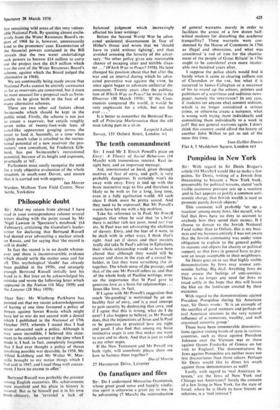The tenth commandment Sir: I read Mr J. Enoch Powell's
piece on Envy: A Theory of Social Behaviour (14 March) with tremendous interest. Real in- sight here, and an important message.
Aid, international or local, given through motives of fear of envy, and guilt, is very probably dangerous. It certainly won't do away with envy. Envy is tied up with the basic instinctive urge to lisle and therefore is likely to be with us for a long, long time, even in a fully egalitarian world. All such ideas I think must be pretty sound. And they need to be expressed. But Mr Powell's words have left me with a big problem.
Take his reference to St PauL Mr Powell suggests that when he said that 'in (Arise there is neither rich nor poor, bond nor free etc, St Paul was not advocating the abolition of slavery. Envy, and the fear of it were, to be dealt with in other ways. I think that's right. And yet if slaves and their masters really did take St Paul's advice in Ephesians, their whole relationship would so have been altered that although they would still be master and slave in the eyes of a casual be- holder, in fact they were something else al- together. The whole sense of the passage, and that of the one Mr Powell refers to, and that of the whole body of Pauline writings, stres- ses the importance that St Paul gave to generous love as a basis for relationships ... Jesus-like love, in fact.
If I agree with Mr Powell's suggestion that much `do-gooding' is motivated by an un- healthy fear of envy, and is a mad attempt to gain security by destroying that envy, and if I agree that this is wrong, what do I do next? I also happen to believe, as Mr Powell does, that the injunctions of Jesus and St Paul to be generous in practical love are right and good. I also find that among my basic instinctive urges is one that makes me want to care and to share. And that is just as valid as my other urges.
If the New Testament and Mr Powell are both right, will somebody please show me how to harness them together?


































 Previous page
Previous page